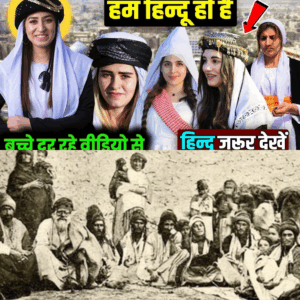The Yazidis of Iraq: Echoes of Ancient India in the Desert Sands
Hidden in the Heart of Iraq: India’s Forgotten Past?
Deep within the harsh deserts of Iraq lies a living mystery—a community whose gods, symbols, and traditions mirror those of ancient India so closely, it almost defies belief. This is not the plot of a movie, but the true story of the Yazidis, a people who speak Kurdish and look Middle Eastern, yet carry in their souls a reflection of Indian culture.
.
.
.
Who Are the Yazidis?
The Yazidis are a small, ancient religious community, their roots stretching deep into the soil of Western Asia. Today, their population is estimated between 800,000 and 1 million, with most living in Iraq’s Nineveh province, particularly around the Sinjar mountains. Yazidis can also be found in Syria, Turkey, Armenia, Iran, and Georgia.
Yazidism is a monotheistic faith, believing in one Supreme God who created the universe and entrusted its care to seven holy angels. Chief among them is Melek Taus, the Peacock Angel, who is revered as the highest divine being—a wise, loyal spirit symbolized by the peacock.

Ancient Scriptures and Beliefs
The Yazidi faith is enshrined in two main holy books:
The Black Book (Mishaf Resh): Describes the creation of the universe and the core beliefs of Yazidism.
The Book of Revelation (Kitêba Cilwe): Contains the teachings and commands of Melek Taus.
Within these texts, you’ll find concepts like the soul, karma, heaven, and hell—ideas that are strikingly similar to those found in Indian philosophy and Hinduism.
Surprising Parallels with Hinduism
The deeper you look, the more uncanny the similarities become:
The Peacock Angel: Melek Taus is the most sacred figure for Yazidis, just as the peacock is the vehicle of Lord Kartikeya in Hinduism and a symbol of purity.
Belief in Reincarnation: Yazidis believe in the rebirth of the soul, echoing the Hindu doctrine of karma and reincarnation.
The Trinity: Yazidi beliefs include a concept of three divine powers—creation, preservation, destruction—mirroring the Hindu trinity of Brahma, Vishnu, and Shiva.
Worship of Fire, Sun, and Water: Yazidis perform rituals honoring fire, the sun, and water, just as Hindus revere these elements in their own sacred ceremonies.
Fasting and Rituals: The Yazidi festival of Jama Ezidi, involving fasting, is reminiscent of Hindu fasts like Ekadashi, Navratri, and Shivratri.
Priestly Classes: Yazidis have religious leaders called Sheikhs and Pirs, much like the Brahmins and priests in Hindu society.
Are Yazidis the Lost Children of Ancient India?
These astonishing parallels have led some scholars to suggest that the Yazidis may be descendants of ancient Aryan groups who migrated west from the Indus Valley or even earlier Vedic civilizations. Linguistic research and DNA studies hint at these deep connections. Their rituals, their reverence for the peacock, fire worship, belief in rebirth, and even the Sanskrit-sounding names of their deities—all point to a shared heritage.
A Community Tested by Time and Tragedy
Yet, history has not been kind to the Yazidis. For centuries, they have faced persecution. In 2014, the world watched in horror as ISIS unleashed genocide upon the Yazidi people—thousands were killed, and women and children were enslaved. Even today, many Yazidis remain in refugee camps, struggling to preserve their identity and traditions.
India’s Unspoken Bond with the Yazidis
When news of the Yazidi genocide spread, India not only expressed sympathy but quietly extended help. Some Yazidi families found refuge in India, and Indian spiritual leaders have shown deep interest in this ancient community. Remarkably, many Yazidis refer to India as their “motherland”—a connection that transcends borders and politics, rooted instead in the soul.
The Enduring Spirit of the Yazidis
Despite unimaginable suffering, the Yazidis have survived—perhaps because their roots are not just in the desert sands, but in the depths of civilization itself. Their songs, prayers, and symbols seem to echo from the banks of the Ganges, carried across time and space to the mountains of Sinjar.
So, are the Yazidis the lost Hindus of Iraq? Are these similarities mere coincidence, or fragments of a forgotten chapter in history? Some say the parallels are too many to ignore; others believe Yazidism arose independently, shaped by cultural exchanges over millennia.
But one thing is certain: The Yazidis and Hindus are like two ancient relatives, separated by time, yet bound by memory. Perhaps, somewhere along the way, history tore out the pages that would have told their shared story.
As the Yazidis continue their struggle for survival, their traditions—like whispers from India’s distant past—remind us that civilization is a tapestry of connections, some faded, some forgotten, but never truly lost.
News
तलाक के 6 साल बाद पति बना SP तलाकशुदा पत्नी चाय बेचती मिली — फिर जो हुआ
अतीत की चाय और वर्दी का प्रायश्चित: एक अनकही दास्तान अध्याय 1: शिवपुर की वो सायरन भरी सुबह उत्तर प्रदेश…
वर्दी का फर्ज या कोई पुरानी दुश्मनी? सुनसान रेगिस्तान में उस बूढ़े की झोपड़ी तक क्यों पहुँची लेडी अफसर?
रेगिस्तान का दरिंदा और जांबाज अफसर: एक खौफनाक जाल अध्याय 1: रेगिस्तान का सन्नाटा और रहस्यमयी झोपड़ी राजस्थान का वह…
Jab Shohar Dubai Se Wapis Aaya Apni Bevi Ko Dekh Kar Uske Hosh Udd Gaye
सुनहरीपुर का शैतान और कोठे का सच: एक खौफनाक साजिश अध्याय 1: विदाई की वह सुनहरी सुबह हिंदुस्तान के एक…
18 year old girl married a 70 year old sick old man. The entire city was stunned!
सब्र का फल और अल्लाह का इंसाफ: ज़ैनब की अनकही दास्तान अध्याय 1: यतीम का आँगन और लालच की दीवार…
Ghareeb aurat Samajh Kar Gadi Ma Baitha Liya… Jab Haqeeqat Pata Lagi Tu, Sab Hairan Reh Gaye!
चौराहे का सच और वर्दी का इंसाफ: एक अनकही दास्तान भाग 1: कानपुर की तपती दोपहर और एक अजनबी दस्तक…
तलाकशुदा IPS अफ़सर ने सरेआम गरीब सब्जीवाले पति को किया सलाम… सच सामने आते ही पूरा बाज़ार सन्न रह गया
वर्दी का सलाम और अतीत का सच: एक अनकही दास्तान भाग 1: बाजार का शोर और खामोश यादें शहर के…
End of content
No more pages to load












